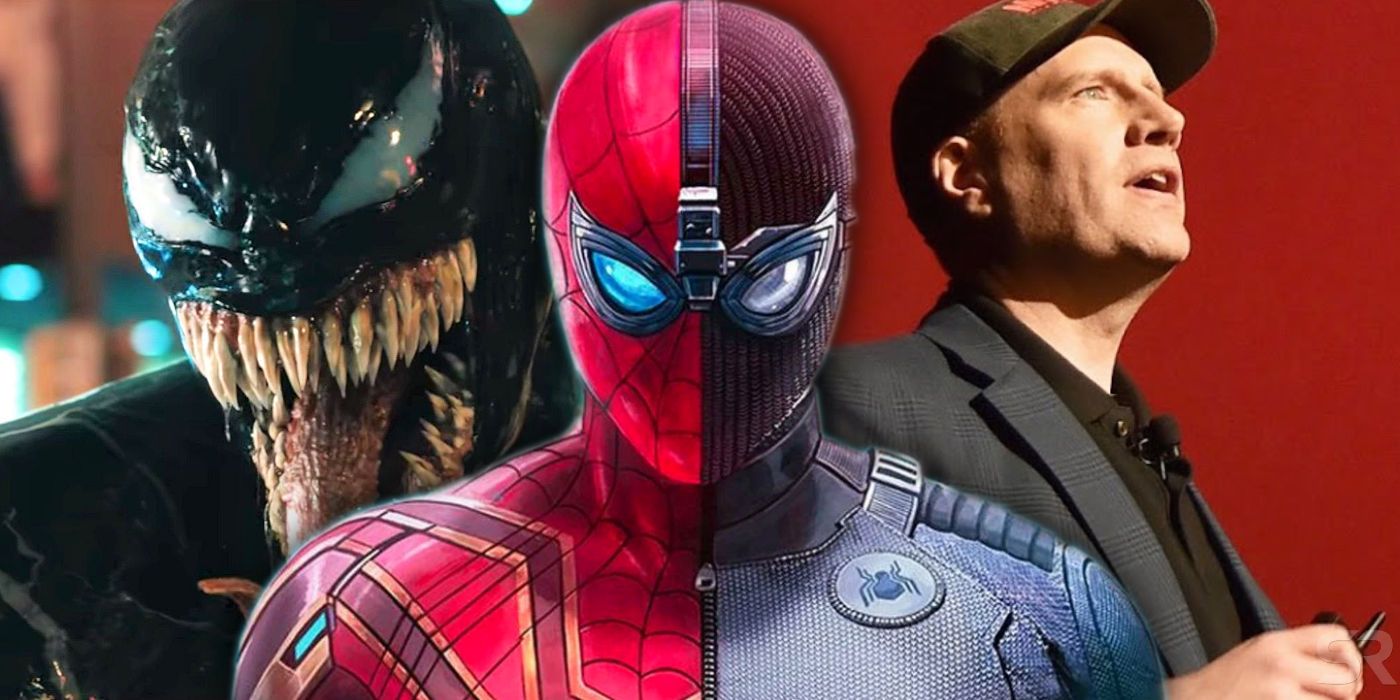Tom Holland's Spider-Man can appear in both the MCU and Sony's Spider-villain universe now, but it won't be easy and it will be messy. Marvel Studios and Sony Pictures have reached a new agreement, meaning Holland's Spider-Man will remain part of the MCU. The two studios will work together on Spider-Man: Homecoming 3, due out in 2021, and the wall-crawler will also appear in another unconfirmed MCU movie.
In addition, though, a careful and deliberate comment from Kevin Feige suggested Holland's Spider-Man could also be part of Sony's villain universe. It's been an open secret that Sony want to find a way to incorporate Spider-Man in their shared universe, and Feige's observation suggests this could actually happen. But what's interesting is that the statements are a marked contrast with the way the initial deal was announced back in 2015.
Back then, Marvel and Sony spelled out exactly what was coming; Captain America: Civil War, a solo Spider-Man movie, and a bright future. This is a lot more secretive, reflecting the fact Marvel Studios has stopped disclosing its long-term plans. As a result, the curious comments raise a simple question: how is Spider-Man going to exist in both the MCU and Sony's shared universe? There are really three possibilities.
Sony's Movies Could Be "Adjuncts" To The MCU
The first option is that Marvel could have agreed to consider Sony's movies part of the wider MCU, with Spider-Man acting as the connective tissue. There's some evidence this has been Sony's goal all along; back in 2017, Spider-Man producer Amy Pascal suggested that Venom and the other Spider-villain films could be considered "adjuncts" to the MCU. The word seemed to denote a similar kind of relationship to the one enjoyed by Marvel Television, who operate in the MCU and have as many nods and tie-ins as possible, but are hardly essential to the narrative thrust of Marvel's shared universe. This would be the ultimate win for Sony, allowing them to capitalize on the MCU's success; Spider-Man's story could swing from Spider-Man: Homecoming 3, through to an Avengers 5 movie, and then on to a Venom team-up. Most viewers wouldn't even notice, let alone care, that the films were being made by different studios.
But is this really likely to be the case? Marvel Studios is essentially the darling of Disney; in his book The Ride of a Lifetime, Disney CEO Bob Iger rhapsodizes about Kevin Feige and Marvel Studios more than he does any other Disney franchise. This is a powerful brand, and allowing the Sony films to enter into it - even if tangentially - could go badly wrong. All it would take is a misstep from Sony, and the Marvel brand would be damaged. That's probably why Marvel resisted the idea in the first place.
Spider-Man Could Jump From One Universe To Another
The next possibility is that Spider-Man could jump between the dimensions, traveling to Venom's universe and then back again. There's comic book precedent for this idea; 2014's "Spider-Verse" event saw Peter Parker learn that all the spiders are connected to a Multiversal force known as the Web of Life and Destiny, and he teamed up with various alternate-reality versions of himself in order to defeat a cosmic threat known as the Inheritors. In the aftermath of "Spider-Verse" - which loosely inspired the animated Spider-Man: Into The Spider-Verse movie - a number of spider-characters were left with inter-dimensional tech. Fast-forward five years, and the popular Spider-Gwen - now dubbed Ghost Spider - still lives in her home reality, but goes to school in the mainstream Marvel Universe.
The Multiverse - which was subtly introduced into the MCU through the Thor movies - looks set to be crucial to Phase 4. Doctor Strange 2 is called "Doctor Strange in the Multiverse of Magic," featuring Scarlet Witch in a prominent role, possibly rewriting her to give her abilities a Multiversal edge. There have been reports that Disney+'s Loki TV series will end with the Loki of another timeline making his way into the mainstream MCU, complete with Mjolnir, explaining how Jane Foster wields the hammer in Thor 4. It's not hard to imagine a scenario where this arc was continued, with Peter Parker gaining the ability to jump between dimensions. Perhaps he could even mirror Spider-Gwen's current story in the comics, given his identity has been revealed in the MCU; he could remain active as a publicly-known superhero in the MCU, but heading to Venom's universe in order to continue his education.
Spider-Man Could Even Leave The MCU Entirely
But there is a third possibility; Marvel could use Tom Holland's Spider-Man in two more movies, and then have him leave the MCU entirely. A number of comic book stories have seen characters, objects, and even locations jump from one reality to another. Examples include 1997's Heroes Reborn: The Return, 2013's Age of Ultron, and 2015's Secret Wars. It's not hard to imagine a blockbuster event movie ending with Spider-Man sacrificing himself in order to save the Multiverse, bringing his MCU story to a close and transplanting himself into an alternate dimension - Sony's Marvel Universe.
There is some evidence to support this idea, with unconfirmed reports suggesting Kevin Feige is planning an endgame that will write Spider-Man out of the MCU. The sad truth is that this would make sense from a business perspective; as things stand, while Spider-Man is back for two more MCU movies, Marvel would need to return to the negotiating table for more Spider-Man when those are done. The new deal seems to work in Sony's favor, with Marvel and Disney signing up to a proposal they reportedly walked away from when it was first discussed. The more firmly embedded Spider-Man becomes in the MCU, the greater the pressure on Marvel to reach a new agreement in a few years' time. From a purely business point of view, Marvel really need to figure out an exit strategy.
-
There's no getting around it; the new Marvel-Sony deal means Tom Holland's Spider-Man will see a dramatic change to his status quo. At this stage, both Marvel and Sony are avoiding spelling out the implications, but they're profound; it's possible they'll even mean a change to the nature of the MCU itself, with Sony's films becoming adjuncts to Marvel Studios' shared universe. But the more likely is that Marvel will be keen to keep a sense of distance, and thus that Spider-Man will - as Feige hinted - wind up jumping between the dimensions. But will he return?










